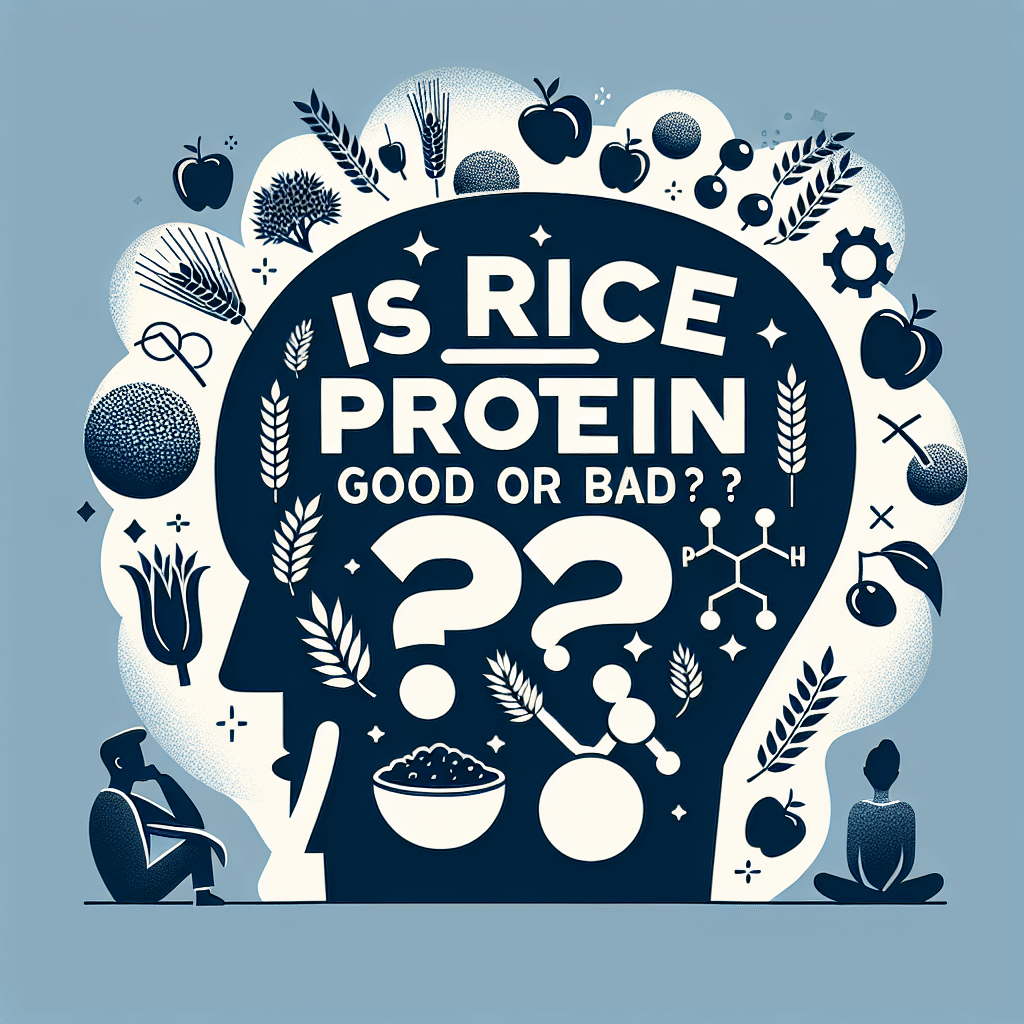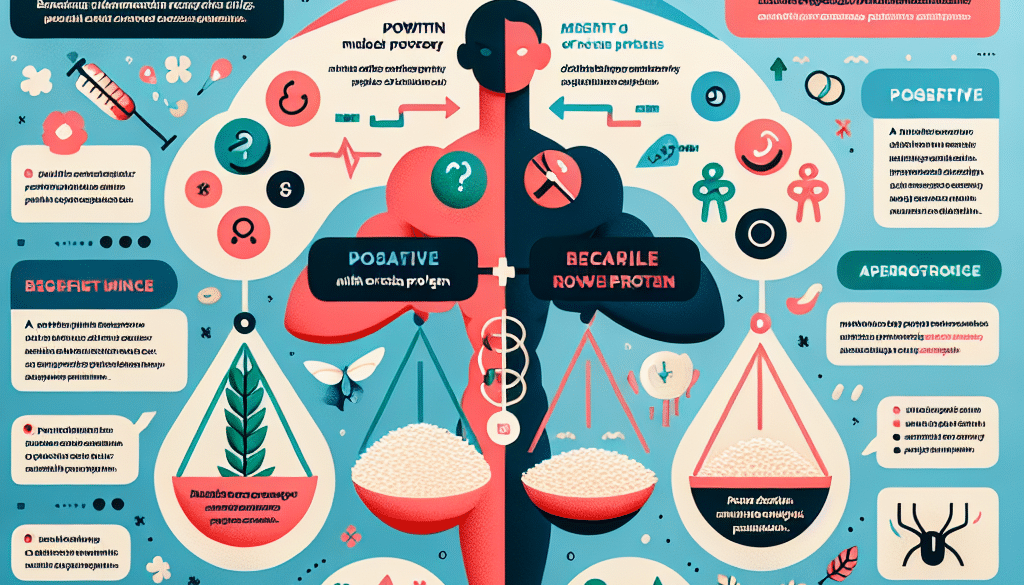Lis Rice Protein Good Or Bad For You? Learn More
Table of Contents
- Is Rice Protein Good or Bad for You? Unveiling the Truth
- Understanding Rice Protein
- The Nutritional Profile of Rice Protein
- Benefits of Rice Protein
- Potential Drawbacks of Rice Protein
- Comparing Rice Protein to Other Protein Sources
- Rice Protein vs. Whey Protein
- Rice Protein vs. Soy Protein
- Rice Protein vs. Pea Protein
- Case Studies and Research on Rice Protein
- Choosing the Right Rice Protein
- Conclusion: Balancing the Pros and Cons
- Discover ETprotein’s High-Quality Protein Products
Is Rice Protein Good or Bad for You? Unveiling the Truth

Protein is a crucial macronutrient that plays a vital role in building muscle, repairing tissue, and producing enzymes and hormones. With the rise of plant-based diets and food allergies, many people are turning to alternative protein sources. Rice protein has emerged as a popular option, but is it good or bad for you? This article delves into the science behind rice protein, its benefits, potential drawbacks, and how it compares to other protein sources.
Understanding Rice Protein
Rice protein is typically extracted from brown rice and is often found in protein powders and supplements. It’s a favorite among vegans, vegetarians, and those with allergies to dairy or soy. But what makes rice protein stand out, and how does it affect your health?
The Nutritional Profile of Rice Protein
Rice protein is a complete protein, meaning it contains all nine essential amino acids, although it’s lower in lysine compared to other protein sources. It’s also naturally gluten-free, making it suitable for those with celiac disease or gluten sensitivity.
Benefits of Rice Protein
- Hypoallergenic: Rice protein is a hypoallergenic alternative to whey and soy proteins, which are common allergens.
- Digestibility: It’s easily digestible and gentle on the stomach, reducing the risk of gastrointestinal discomfort.
- Weight Management: Protein can help in weight management by promoting satiety and reducing appetite.
- Muscle Growth: Like other proteins, rice protein supports muscle growth and repair, especially when consumed after exercise.
Potential Drawbacks of Rice Protein
While rice protein offers several health benefits, there are potential drawbacks to consider:
- Lysine Content: Rice protein is lower in the essential amino acid lysine, which is important for immune function and collagen production.
- Heavy Metals: Some rice protein powders have been found to contain traces of heavy metals, though this is largely dependent on sourcing and manufacturing practices.
Comparing Rice Protein to Other Protein Sources
When evaluating rice protein, it’s helpful to compare it to other popular protein sources, such as whey, soy, and pea protein.
Rice Protein vs. Whey Protein
Whey protein is a byproduct of cheese production and is known for its high biological value and rapid absorption. However, it’s not suitable for vegans or those with lactose intolerance. Rice protein offers a plant-based alternative with a slower absorption rate, which can provide a steady supply of amino acids.
Rice Protein vs. Soy Protein
Soy protein is another complete plant-based protein. However, concerns about soy’s phytoestrogens and potential GMO status lead some consumers to prefer rice protein, which is often non-GMO and free from phytoestrogens.
Rice Protein vs. Pea Protein
Pea protein is another popular plant-based protein that is rich in iron and arginine. While pea protein is higher in lysine than rice protein, combining the two can create a more balanced amino acid profile.
Case Studies and Research on Rice Protein
Several studies have investigated the effects of rice protein on health and performance. For example, a study published in the Journal of the International Society of Sports Nutrition found that rice protein isolate could provide the same benefits as whey protein in terms of body composition and exercise performance when taken post-workout.
Choosing the Right Rice Protein
When selecting a rice protein product, consider the following:
- Quality: Look for products with minimal additives and fillers.
- Origin: Choose rice protein sourced from areas with low heavy metal contamination.
- Third-Party Testing: Opt for brands that undergo third-party testing for purity and contaminants.
Conclusion: Balancing the Pros and Cons
Rice protein offers a valuable plant-based protein option, especially for those with dietary restrictions. While it has a lower lysine content and potential heavy metal concerns, its hypoallergenic nature and digestibility make it a viable choice for many. As with any dietary choice, it’s important to consider your individual health needs and consult with a healthcare professional.
Discover ETprotein’s High-Quality Protein Products
If you’re looking for premium rice protein products, ETprotein offers a range of organic, non-GMO, allergen-free options. Their rice protein is characterized by a neutral taste and high purity, making it an excellent choice for various industries. Whether you’re in the nutraceutical, pharmaceutical, or food and beverage sector, ETprotein can meet your protein needs with their extensive product range.
About ETprotein:
ETprotein, a reputable protein and L-(+)-Ergothioneine (EGT) Chinese factory manufacturer and supplier, is renowned for producing, stocking, exporting, and delivering the highest quality organic bulk vegan proteins and L-(+)-Ergothioneine. They include Organic rice protein, clear rice protein, pea protein, clear pea protein, watermelon seed protein, pumpkin seed protein, sunflower seed protein, mung bean protein, peanut protein, and L-(+)-Ergothioneine EGT Pharmaceutical grade, L-(+)-Ergothioneine EGT food grade, L-(+)-Ergothioneine EGT cosmetic grade, L-(+)-Ergothioneine EGT reference grade and L-(+)-Ergothioneine EGT standard. Their offerings, characterized by a neutral taste, non-GMO, allergen-free attributes, with L-(+)-Ergothioneine purity over 98%, 99%, cater to a diverse range of industries. They serve nutraceutical, pharmaceutical, cosmeceutical, veterinary, as well as food and beverage finished product distributors, traders, and manufacturers across Europe, USA, Canada, Australia, Thailand, Japan, Korea, Brazil, and Chile, among others.
ETprotein specialization includes exporting and delivering tailor-made protein powder and finished nutritional supplements. Their extensive product range covers sectors like Food and Beverage, Sports Nutrition, Weight Management, Dietary Supplements, Health and Wellness Products, and Infant Formula, ensuring comprehensive solutions to meet all your protein needs.
As a trusted company by leading global food and beverage brands and Fortune 500 companies, ETprotein reinforces China’s reputation in the global arena. For more information or to sample their products, please contact them and email sales(at)ETprotein.com today.












